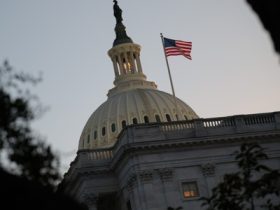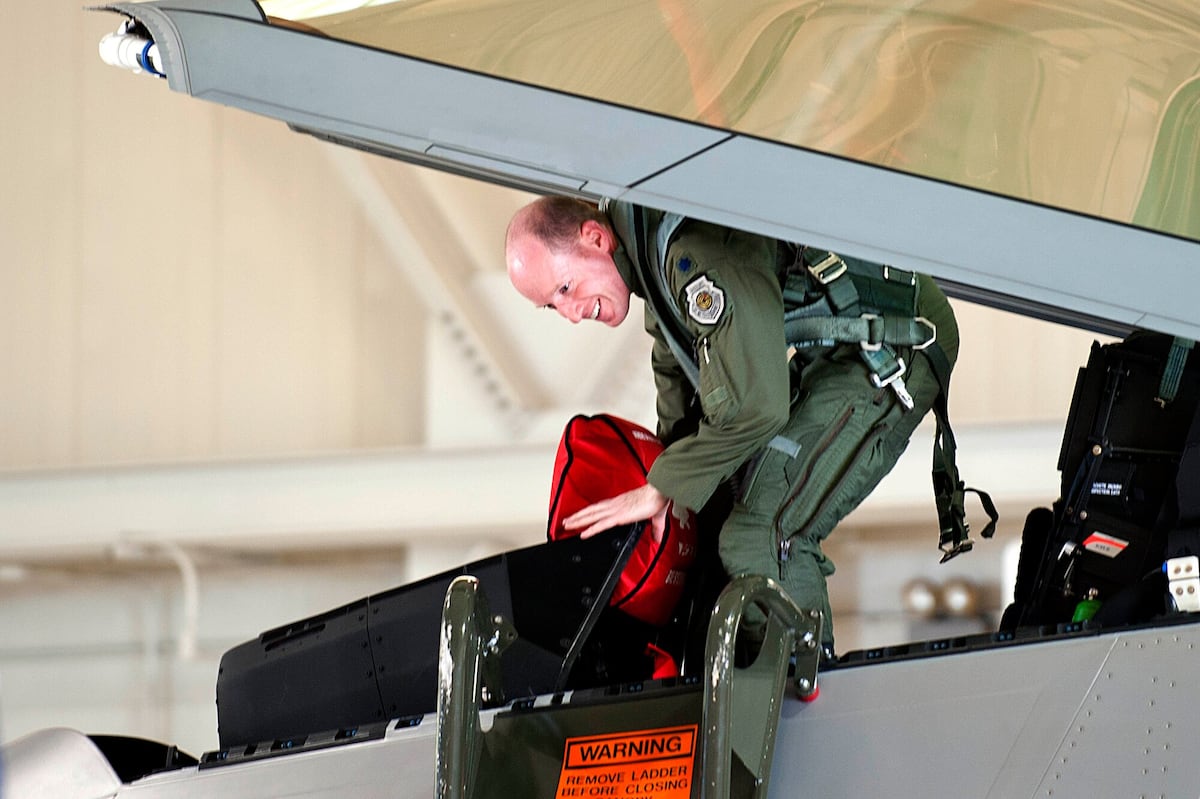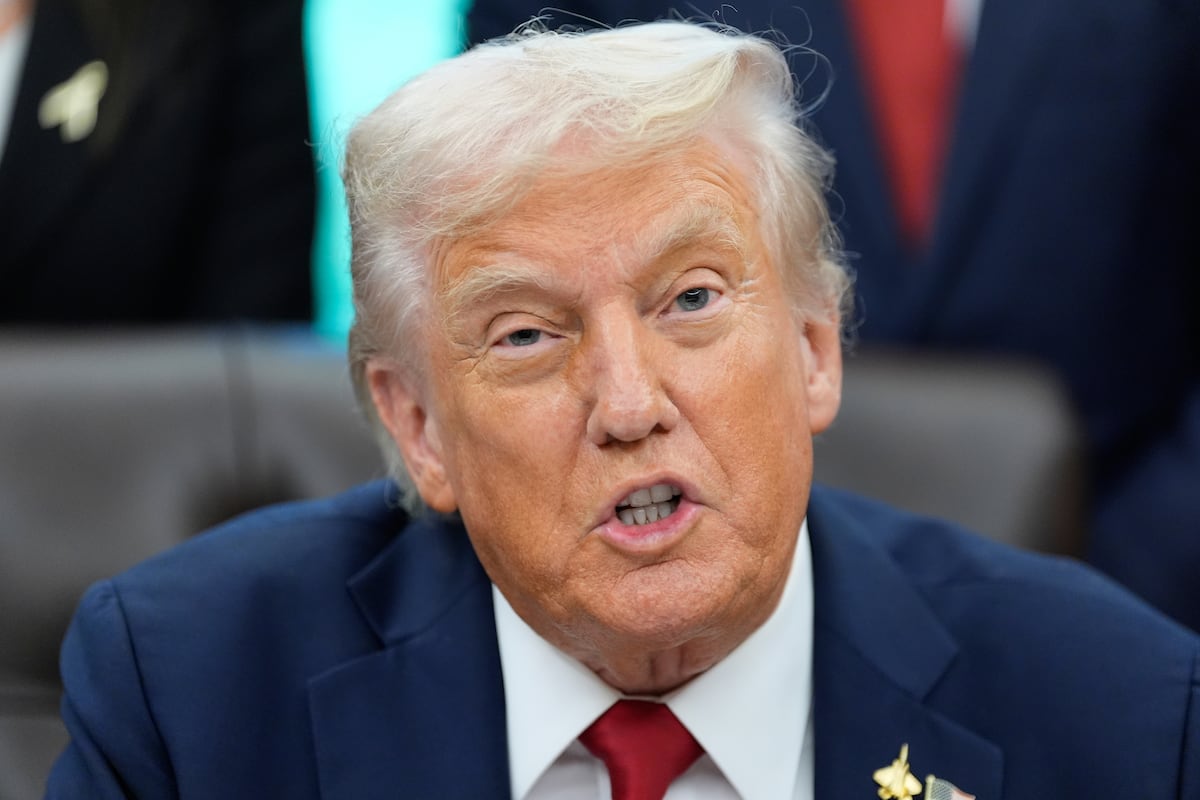President Trump’s military takeover of America’s capital city means troops are tasked with “area beautification” and “monument security,” Pentagon spokeswoman Kingsley Wilson told reporters Thursday.
The deployment of some 800 Air and Army National Guardsmen is intended to help the city’s temporarily federalized police with “monument security, community safety patrols, protecting federal facilities and officers, traffic control posts and area beautification,” Wilson said. That includes presence on the National Mall, though Wilson did not answer questions about the specific crimes the Trump administration believes need to be stamped out near the monuments and museums, Defense One’s Meghann Myers reports.
“They will remain until law and order has been restored in the district, as determined by the president, standing as the gatekeepers of our great nation’s capital,” Wilson said. But she did not say how the restoration of law and order would be measured.
Reminder: Trump offered false and exaggerated crime statistics to justify his action in a Monday press conference announcing the Guard deployment and his takeover of the D.C. police.
Commentary: “How to Truly Keep Washington, DC Safe,” according to Donnell Harvin, former Chief of Homeland Security and Intelligence for the District of Columbia, writing Friday for Just Security. Instead of turning to a militarized police state, “What does work, based on extensive research, are summer youth employment programs (SYEPs), especially when paired with mentoring,” Harvin says. Consider, he writes, that “In Chicago, a six-week summer jobs program reduced participants’ violent-crime arrests by roughly one-third over the following year; in New York City, SYEP participation lowered the chance of any arrest during the program summer by 17% and felony convictions by 38% (see research results here, here, and here).”
And for those living on the streets or in tent communities, “The U.S. Interagency Council on Homelessness (USICH) and HUD have repeatedly demonstrated that strong housing programs and permanent supportive housing dramatically improve housing stability and reduce costly crisis service use.”
“The intelligence analyst inside of me says that there is a more strategic game afoot,” Harvin warns, and suggests, “In my best assessment, the takeover of the DC police provides the administration with the administrative and operational blueprint and legal precedent for rapidly responding to major political demonstrations or civil unrest in DC that are likely to materialize in the future.”
It’s a plausible framing of recent events for Defense Department operations under Trump, a president unafraid of politicizing the military (see the Associated Press and Washington Post’s editorial board, e.g.) while rolling out numerous policies intimidating or removing countless minorities nationwide.
Consider as well: Under Trump, the Army removed its chief public affairs officer after just one year on the job, (see the service’s blank webpage here) and is replacing Brig. Gen. Amanda Azubuike with a civilian—Rebecca Hodson, “a veteran of Republican campaign finance in North Carolina,” Military-dot-com reported two weeks ago.
The Navy is poised to follow suit, with its chief information officer, Rear Adm. Ryan Perry, expected to retire soon—his three-year tenure expired early last month—and no one has yet been tapped to fill the post though it could still happen.
One lingering consideration: Does it even matter who handles public affairs for these services? Some would argue it does not. After all, “[W]hile officers like Perry and Azubuike are often billed as the top spokespeople for their respective services, leaders in their posts actually spend very little of their time dealing with questions from reporters or drafting statements,” Military-dot-com wrote in late July.
Related reading:
Welcome to this Friday edition of The D Brief, a newsletter dedicated to developments affecting the future of U.S. national security, brought to you by Ben Watson and Bradley Peniston. Share your tips and feedback here. And if you’re not already subscribed, you can do that here. On this day in 2021, Afghanistan’s president fled the country as Taliban fighters flooded Kabul and took control of the capital city.
Industry
China is working on reusable rockets—and a strategic leap in space power. “On May 29, the Yuanxingzhe-1 suborbital rocket took off from a platform in the Yellow Sea, carrying with it not just the hopes of its maker—a Chinese commercial launch firm called Space Epoch—but also the prospects for China’s next phase in its space power,” write Peter W. Singer and Alex Nova in the latest edition of The China Intelligence column.
“The 64-meter rocket came to a hover about 2.5 km up, then landed vertically at the Oriental Spaceport in Haiyang, Shandong, marking the first known successful maritime vertical takeoff and vertical landing by a Chinese rocket company. The test flight drew far less international coverage than, say, the pioneering SpaceX flights that preceded it. But it underscores China’s rapidly accelerating efforts to master reusable rocket technology.” Read on, here.
Related reading:
New Golden Dome details emerge from industry day. Automation and AI ideas—including an “AI-Enabled Fire Control Concept”—were a central feature of the Pentagon’s presentations to defense-industry representatives at a closed-door but unclassified meeting held last week in Huntsville, Alabama. AI is expected to help network a wider variety of radars and missile batteries, and may enable the tracking of far more missiles than is possible today, reports Defense One’s Patrick Tucker, who obtained a copy of the briefing slides presented during the meeting.
Other discussions concerned the satellite weapons that Pentagon leaders want to invent for the sprawling air-and-missile-defense program. “If you want to test a space-based interceptor, you don’t have to necessarily launch it into orbit and then test it there. You could do suborbital testing of your kill vehicle with much cheaper launch costs and a much faster schedule,” said one attendee.
The curtain of secrecy around discussions renewed questions about the controversial program. Experts have cast doubt on the administration’s claims about the system’s timeline, projected cost, practicality, and effect on deterrence. “‘Golden Dome’ probably sounded good to the president, and now no one is going to talk him out of it—especially given that the administration is willing to throw mountains of money at such a program, just as Reagan did,” Tom Nichols wrote in The Atlantic. “Hegseth can order his people not to talk about it at public gatherings, but at some point, the administration should answer the two most important questions about an expensive system that could destabilize nuclear deterrence: What is Golden Dome supposed to do, and does it have any chance of working?”
Additional reading:
Read the full article here








Leave a Reply